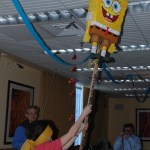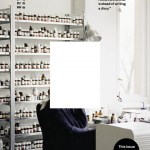new media
It's been an exciting week for me. On Monday I successfully defended my thesis! Now that I have established my scientific credibility to you all, here is a picture of me at my defense party wearing my "Trust me I'm a Dr" Dr. Pepper t-shirt and hitting my SpongeBob SquarePants piñata.
And on Tuesday I went to two really interesting events/talks/discussions about science and scientists. First up was Debbie Chachra's awesome seminar "Unpacking Gender: Men and Women in Science, Technology, and More," sponsored by the Harvard Graduate Women in Science and Engineering. She described her seminar…
There has been a surge of interest recently in science denial, particularly revolving around the issue of vaccines. Last year saw the release of Michael Specter's Denialism; in the last few months, three others have been released: Seth Mnookin's Panic Virus, Robert Goldberg's Tabloid Medicine, and Paul Offit's "Deadly Choices." More about each of them after the jump.
"The Panic Virus" by Seth Mnookin focuses on the general topic of media-fueled science denial, using vaccines as the case study. Like Offit's recent "Autism's False Prophets, Mnookin details a bit of the history of the anti-…
I've been playing a bit with the alpha of Qwiki, a new website that offers users an innovative "information experience." The site collects images, videos, and text about topics from the internet and then displays the images future-aesthetically while reading the information in a delightful robot voice. There are still some kinks to work out, but overall it's kind of cute and fun! Here is Qwiki Science:
And Qwiki Science Heroes--Carl Sagan:
Just like on wikipedia, it's easy to fall into a procrastination spiral clicking on related links, but it's worth signing up and poking around!
My friend Patrick is embarking on a 48 experiment, studying circadian rhythm and destroying his own in the process. He's also embarking on a social media experiment, live-streaming the whole thing on ustream.
Tune in to watch real science in action and the effects of sleep deprivation on scientists! You can even ask him questions during the three hours between experimental time points!
Nick pointed me to a fabulous podcast series by CBC radio called "How To Think About Science." Each episode is a long and fascinating interview with a prominent scholar of science--scientists, philosophers, sociologists, anthropologists, and historians who explore how science is done, how scientists work, and how scientific ideas and facts are communicated. Check it out!
My Synthetic Aesthetics partner, Sissel Tolaas, is featured in the terrific current issue of the German interview magazine mono.kultur. Her work focuses on smell, exploring the unique smellscapes of different cities, creating provocative scents to show in art galleries, branded "logo" scents for Adidas, "Swedish" scents for Ikea, and therapeutic memory-triggering scents, part of the healing process for patients dealing with traumatic experiences. Until we have smell-o-vision, her work is almost aggressively analog--"beyond what is seen and heard to something indiscernible yet more…
My semester in MIT's course on Documenting Science Through Video and New Media has drawn to a close. I've had a wonderful time and learned a lot about how films and science are constructed by different people in different times for different reasons. Most of all I've learned about how challenging it can be to put together an interesting narrative and present a point of view while at the same time ensuring that the science being explained is honest and clear to everyone. I've recently gotten the chance to watch two great recent science documentaries outside of class, Naturally Obsessed and…
I got the chance to attend a panel discussion about science and the media presented by the UK-based charity Sense About Science. The audience was primarily scientists, many of whom were angry about how science is presented in the media: the outlandish claims, the hype, presenting "both sides" of stories where there is clear scientific consensus. The panel included a professional scientist who teaches about communicating with the public, an editor at the journal Cell, and a science reporter for the Boston Globe.
The panel was mostly about "traditional" media, with a little shout-out to blogs…
I got a lot of interesting responses to my post about DIYbio and how modeling innovation in biotech on computer hacker culture may lead to a science that is less "democratized" than what is being proposed. My friend Adam pointed me to Jaron Lanier's work criticizing the "open" and "free" culture movements online as both unfair and leading to cultural stagnation. While I don't agree with all of Lanier's arguments about the prospects of an open digital culture, he makes a lot of really important points that resonate with my feelings about the future of science based on the open online model, in…
Here's my first little editing project for my documentary film class. A day in the lab, but much much faster paced.
I'm auditing a really cool class at MIT this semester called "Documenting Science Through Video and New Media." In the first class, we watched some of the earliest science films ever made, microscopic vaudeville performances by cheese mites and flies, made into a little meta-documentary by New Scientist a couple years ago. The videos are really fun, combining a sense of wonder at the beauty and complexity of the natural world with a sense of the excitement and spectacle of moving pictures. Science and nature documentaries like these became a hugely popular hit, and still are today with series…
While news from Iran streams to the world, Clay Shirky shows how Facebook, Twitter and TXTs help citizens in repressive regimes to report on real news, bypassing censors (however briefly). The end of top-down control of news is changing the nature of politics.
Clay Shirky: Clay Shirky's consulting focuses on the rising usefulness of decentralized technologies such as peer-to-peer, wireless networks, social software and open-source development. New technologies are enabling new kinds of cooperative structures to flourish as a way of getting things done in business, science, the arts and…
Scibling Bora has expressed his wish "to end once for all the entire genre of discussing the "bloggers vs. journalists" trope," and tried to do so with perhaps the most massive science-journalism-Web2.0 post evah.
Bora says,
the whole "bloggers will replace journalists" trope is silly and wrong. No, journalists will replace journalists. It's just that there will be fewer of them paid, and more of us unpaid. Some will be ex-newspapermen, others ex-bloggers, but both will be journalists. Instead of on paper, journalism will happen online. Instead of massaging your article to fit into two inches…
As promised, photos* from last Friday with 'the Bloggerati'. Here I'm in terrific company with Misha, Bora, and Abel over lunch in Durham:
Bora and I chat with students about why we blog:
* Special thanks to Abel for sharing the images! For a terrific detailed description of the day, visit Terra Sigillata...

